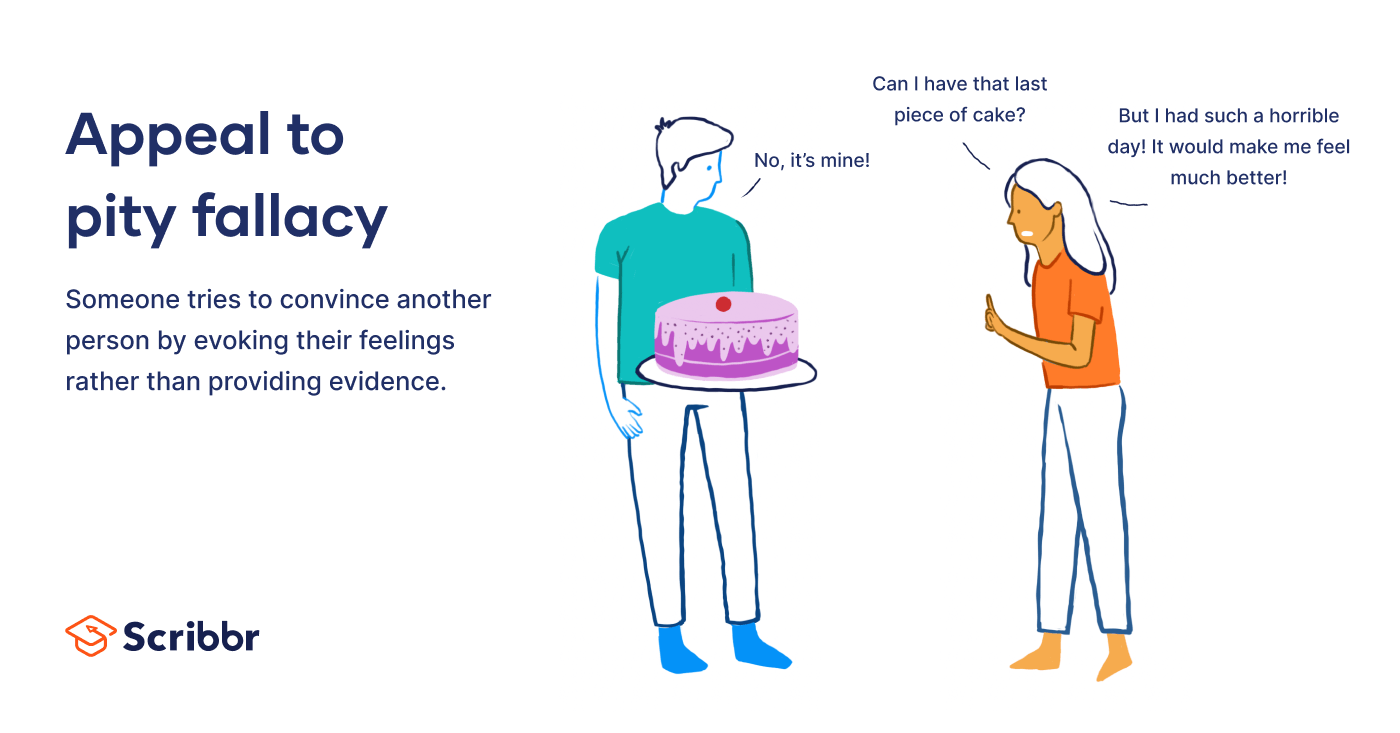Appeal to Pity Fallacy | Definition & Examples
The appeal to pity fallacy occurs when someone attempts to persuade others by provoking feelings of guilt or pity. Instead of presenting factual information and evidence to support an argument, one may try to play on people’s feelings. However, this is a manipulative tactic because feelings of pity are usually irrelevant to the point being made.
The appeal to pity fallacy is also known as argumentum ad misericordiam or argument from pity and can be observed in various contexts like marketing, political campaigns, and law.
What is the appeal to pity fallacy?
The appeal to pity fallacy occurs when someone substitutes logical evidence in an argument with a claim intended to elicit pity or guilt. However, feelings don’t serve as evidence for the truth of a claim. When we accept a conclusion regarding what should be a logical issue just because we feel sorry, we fall for this type of fallacy.
Appeal to pity is an informal fallacy. In other words, the content of the argument fails to provide adequate reasons for believing the truth of the conclusion. More specifically, it is a fallacy of relevance: these fallacies appeal to evidence or examples irrelevant to the argument at hand.
The appeal to pity fallacy is a variation of the appeal to emotion fallacy. If we can’t find a way to support our view with solid arguments, it may be tempting to arouse emotions in others so that they accept our conclusion. Although there is nothing wrong with using emotions when we argue, it is a fallacy to use emotions as a diversion or as proof that what we say is true or correct.
Are appeals to pity always fallacious?
An appeal to pity is not always fallacious. In fact, an appeal to pity is a variation of the rhetorical strategy known as appeal to emotion (or pathos). People may try to capitalise on any number of our emotions to persuade us, including pity. Such appeals may be legitimate as long as they are presented along with sound evidence.
Additionally, you could appeal to people’s sense of pity by describing how shelter dogs long for a loving family and a warm bed, yet they’re often overlooked in favour of purebred dogs.
In general, whether or not an appeal to pity is fallacious depends on how relevant the pity evoked is to the matter in question. When discussing personal stories or experiences that are relevant to a broader issue, like human trafficking, emotions can play a legitimate role in understanding and empathising with others’ perspectives. It is the absence of supporting evidence that makes an appeal to pity fallacious.
Appeal to pity fallacy examples
In a court of law, the appeal to pity fallacy is often used to distract from the facts of the case and to gain sympathy from the judge, jury, or members of the public.
Here, the attorney is trying to make the jury feel sorry for the defendant so that they give him a favourable verdict. However, this is a way to distract the jury from the evidence and legal arguments related to the charges. One’s difficult life circumstances are not always relevant when determining whether someone is guilty of a crime. It may be relevant in trying to decide what sentence is fair, but a just court of law should base its decision on evidence and legal principles, not emotional manipulation.
Propagandists rely on fallacious appeals to pity in an attempt to make their audiences more receptive to their divisive message.
In this example, the speaker is using the suffering or pain of victims or their relatives as evidence to support their argument. However, the natural sympathy we feel for the victims and their families does not prove the conclusion to be true (i.e., that all illegal immigrants are violent criminals).
By evoking feelings of sympathy, the speaker tries to dismiss the original argument (i.e., that not all illegal immigrants are violent offenders) without providing any factual evidence or logical reasoning. While the suffering of victims and their relatives should be acknowledged, it does not necessarily invalidate the argument.
Logical discussions should be based on data, statistics, and rational reasoning rather than appeals to emotion. Furthermore, the impression that most victims or their relatives believe something to be true does not make it so (this is an example of the ad populum fallacy).
Other interesting articles
If you want to know more about fallacies, research bias, or AI tools, make sure to check out some of our other articles with explanations and examples.
AI tools
Fallacies
Frequently asked questions about the appeal to pity fallacy
Sources for this article
We strongly encourage students to use sources in their work. You can cite our article (APA Style) or take a deep dive into the articles below.
This Scribbr articleNikolopoulou, K. (2023, November 13). Appeal to Pity Fallacy | Definition & Examples. Scribbr. Retrieved 25 December 2025, from https://www.scribbr.co.uk/fallacy/appeal-to-pity-fallacy/
Walton, D. (1997). Appeal to pity : Argumentum ad misericordiam. http://ci.nii.ac.jp/ncid/BA50492192




